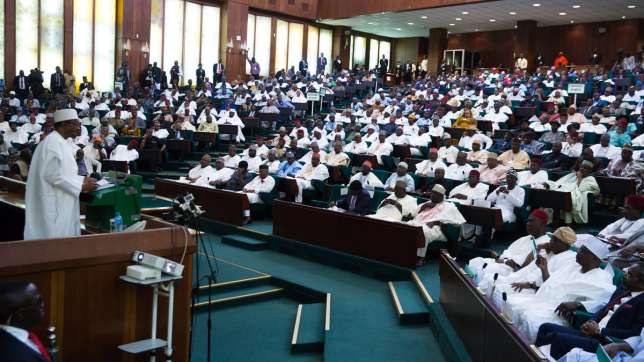President Muhammadu Buhari will be presenting the 2018 appropriation bill at the joint session of the National Assembly today.
President Buhari had written to inform both chambers of the National Assembly on Thursday, November 2, 2017.
Security has been beefed up at the National Assembly ahead of President Buhari’s arrival at 2pm.
At the gate to the National Assembly on Tuesday morning, the Biblical story of the judgement day is playing out.
There is a ‘book of life.’
Only those whose names are on the list were allowed in.
Others can go to hell. Just for today.
Legislative aides, journalists and staff of the National Assembly whose names were missing from the book were turned back.
Business activities have also been grounded.
Ahead of the budget presentation, secretary to the government of the federation, Boss Mustapha had met with Senate President Bukola Saraki and Speaker Yakubu Dogara on Monday, November 6, 2017.
The Meeting was part of efforts by the executive to douse the tension among lawmakers against the event.
Lawmakers at the House of Representatives had protested Buhari’s letter informing the lower chamber of the 2018 budget presentation.
The lawmakers had protested the poor implementation of the 2017 budget.
According to the 2018-2020 medium term expenditure framework and fiscal strategy paper submitted to the National Assembly, the federal government plans to spend about N8.6 trillion next year.
The proposed amount represents a 15 percent increase from the 2017 budget.
The budget is predicated on an oil benchmark of $45 per barrel, with daily production output of 2.51 million barrels per day (bpd) exchange rate stands at N305/$1.
“In line with current realities in the international oil market, including weakening outlook of future prices occasioned by rising oil and unconventional oil supplies and slow economic recovery, as well as other potential downside risks, a benchmark oil of $45pb for 2018, $50pb for 2019 and $52pb in 2020 have been proposed,” the document said.
Fiscal deficit was estimated to increase by N592.75bn (or 25.0%) from the estimate of N2.36trn in 2017.
The actual expenditure showed that N3.169trn is for recurrent (non-debt); N2.122trn for personnel costs (MDAs); N2.028trn for debt service; N350bn for special intervention programme (recurrent); N245.2bn for overheads; N191.631bn for CRF pensions; N194.339bn for power sector reform programme; N198.7bn for Service Wide Votes
The breakdown indicated that N2.122trn would be share of oil revenue; N1.373trn for non-oil; N807.8bn from Companies Income Tax (CIT); N807.570bn from independent revenue; N277.562bn from the Customs; N241.920bn from Value Added Tax (VAT) and N114.298bn from Federal Government’s share of signature bonus, among others.
CULLED FROM pulse.ng



